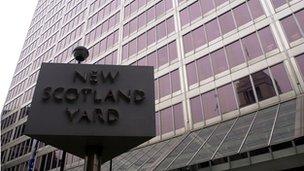Met Police got £22.7m from sponsors, FOI request finds
- Published
- comments

Between April 2007 and March this year the Met received at least 833 donations
The Metropolitan Police has received donations and sponsorship worth £22.7m from dozens of organisations over the past five years, the BBC has learned.
The figures were disclosed following a Freedom of Information Act request.
Donations ranged from football shirts provided by Queens Park Rangers and Chelsea, to motorcycles and cars supplied by Land Rover, BMW and Nestle.
Scotland Yard said it had a "long history" of working with different partners to tackle crime.
BBC home affairs correspondent Danny Shaw said the figures provided an insight into some of the less well-known sources of income at Britain's biggest police force.
Between April 2007 and March this year the force received at least 833 donations, with a number of police stations and units across London being the beneficiaries.
Some of the donations were given to teams working within local communities on crime reduction projects.
An oil security organisation helped pay for a police constable to reduce crime at petrol stations, and record company EMI donated 11 concert tickets.
The biggest donor was the Association of Payment Clearing Services, which later became UK Payments Administration Ltd, which represents members of the financial services industry.
It spent £11.9m in 21 instalments on a fraud investigation unit called the Dedicated Cheque and Plastic Crime Unit.
Officers in the unit work with banking industry fraud investigators and is fully sponsored by the banking industry which invests nearly £5m per year in its operation.
'Declining budgets'
The figures also show many local businesses across the force's boroughs have donated patrol mountain bikes to help police in their areas, while BMW and Land Rover UK donated support vehicles for royal protection and Special Branch.
In a statement the Met said funding from organisations was used in several areas of police activity such as the Dedicated Cheque and Plastic Crime Unit.
"Donations and sponsorship over £50,000 must be referred to the deputy mayor for policing and crime for approval.
"Such arrangements are subject to rigorous parameters. They do not make any of the statutory functions of the MPS dependent on this funding nor does it allow for any companies to interfere with the duties of the police."
The Association of Chief Police Officers says in its guidance that such income generation can "help forces counter the effects of declining budgets and increasing pressure on resources".
It says sponsorship is subject to a 1% limit of the force's total annual income, and the acceptance of sponsorship for non-core police activities is intended to extend and enhance the force's service to the community.
London Assembly Green member Jenny Jones questioned whether it was right for police to accept such donations and called for the Met to "rethink" the policy.
Speaking to BBC Radio 4's Today programme, she said: "Some of this looks like rent-a-cop policing, which I think the majority of the public would not find acceptable.
Green Party's Jenny Jones: Some of this looks like rent-a-cop policing
"Plus... might the companies think they're going to have a preferential treatment when they come to perhaps tendering for a contract with the Met?
"At worst, it could distort policing priorities, I don't think there's any doubt about that. It's a very, very dodgy sort of situation and the Met does - I think - need to clean up its act a little bit."
'Under public scrutiny'
But Dr Tim Brain, a former chief constable for Gloucestershire Police and a research fellow at Cardiff University, told the programme there was no problem with such donations.
"It's allowed by law. There's the transparency that's shown by the fact that you've had this request and all the information is now in the public domain.
"But crucially, it's important to see it in the financial context. We're talking £22.5m over five years.
"The Metropolitan Police budget is £3.5bn annually. So this represents a very small part of their business which is under public scrutiny."
He added there were real "opportunities" to "capitalise on the good will" of local people and organisations, while making sure private hire of policing, sponsorship and donations remain transparent.
Keith Vaz, the Commons Home Affairs Committee chairman, said the Metropolitan police should "consider very carefully" whether any gifts "could be perceived as compromising the force's position".
He added: "The Home Affairs Committee is currently holding an inquiry into leadership and standards in the police, and we will be hearing from the commissioner on these matters."
- Published30 October 2012